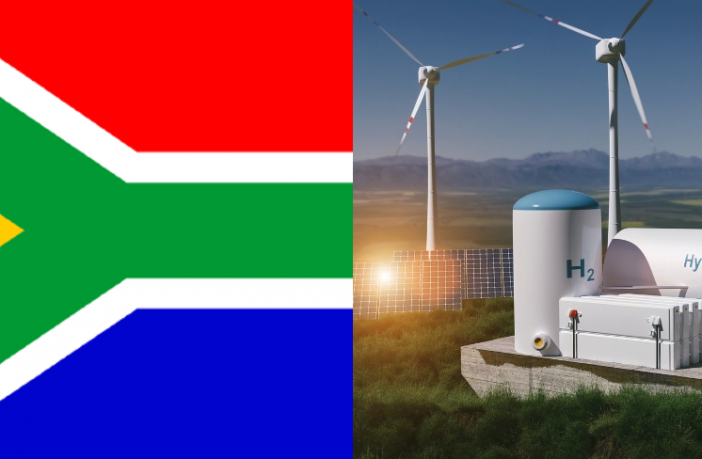- A new study shows how green hydrogen can lead to a ‘Win, win’ for South African employment and for the government’s decarbonization goals.
- The global information and insight company IHS Markit today published the results of a detailed, sector by sector study of S Africa’s future opportunities to use the country’s resources of wind and sun to make low-carbon hydrogen—for export and for use in the home economy.
The research, grounded in today’s realities of S Africa’s coal-dependent energy and industrial systems and of current economic and social challenges, especially in electricity supply, nevertheless concludes that S Africa is well-placed to pursue a national strategy based on low-carbon hydrogen.
Hydrogen as key to deep decarbonization. “Renewables in the power sector with progressive coal retirements can directly eliminate only 40 to 45% of total S African CO2 emissions”, says the study. “Gradual adoption of electrification alone will not be sufficient. Green hydrogen enables a push to deeper decarbonization.
As costs for making green hydrogen come down worldwide, South Africa’s resources of wind and sun can be developed beyond the power sector. They can combine with the country’s industrial expertise and existing investments to create a new-generation synfuels industry, backed by hydrogen electrolysis. A ‘hydrogen high road’ offers both an economic boost – and thus an increase in jobs – and a deeper/faster route to decarbonization.
The study assesses this scenario in comparison to a scenario of inertia based on current industrial and power sector strategy. It quantifies the potential increase in employment at over 370,000 additional jobs1 by mid-century – 1 76,000 in operational positions for renewables and hydrogen production; 22,000 long-term sustainable construction jobs; and over 290,000 in manufacturing and logistics supporting input and services in the enhanced green economy. The study estimates that 25% of these additional jobs can be realized by 2030, benefitting all regions of the country, and spreading into several different sectors of employment. Emissions of CO2 would also be 70 percent lower.
Export opportunities will be available as European and Asian countries recognise they need large-scale imports of green hydrogen to meet their own decarbonization targets. The study favourably compares the economics of transporting green hydrogen from S Africa to the Netherlands and to Japan with other potential hydrogen exporters in the Middle East, North Africa and Australia.
Key domestic sectors that would become big users of hydrogen would include the synthetic fuels industry (saving 48 million tonnes of CO2 emissions per year), steel (saving 10 million tonnes of emissions), chemicals and refining (saving 1.5 million tonnes). Remote and heavy-duty vehicles, where battery solutions are not viable, would see a savings of 8 million tonnes with a 25% shift to hydrogen fuel cells. Industrial processes where electrification cannot meet their specific combustion/heat needs would see savings of up to 4 million tonnes.
Policy and regulatory framework
A national hydrogen strategy will be an important framework for working towards these goals. Such a strategy would look to adapt the policy and regulatory environment to provide support to risk-taking private sector capital. Key insights from the study include:
- Grid integration, and new rules to allow better wheeling of electric power, will be important to obtain the best synergies between hydrogen manufacture from electrolysis and intermittent (wind and solar) renewable power generation.
- Funding support can preferentially be targeted from green-focussed recovery programmes in Europe and other OECD countries, especially where these look to support host country import needs or offer markets for their technology. S African state funding would not need to be a frontline policy.
- Gauteng Province benefits most, with a 130,000 net employment gain. Cape provinces gain 93,000, and Mpumalanga Province, which bears the largest impact in terms of employment moving away from coal (around 7,000 would need to be redeployed) gains 36,000 alternative jobs.
- Government-led mandates for sustainable product/material usage, and corporate pledges to improve supply chain sustainability, have a role to play and need encouragement.
- Each major development for hydrogen supply (the study identifies several ‘early stage’ low regret projects) should be sized to provide additional capability to prime and support smaller scale use in domestic ‘Hydrogen Zones’ for green product manufacture and fleet-fuelling stations. Coordination of anchor demand loads and of storage facilities can be a valuable supportive aim of policy.
The study concludes that with a supportive commercial and policy environment, a production of 3.5+ million tonnes per annum of hydrogen could be developed in South Africa by 2050 (0.75 mtpa by 2030). Of this, over 2.0 mtpa would be for domestic consumption – equal to between 6 and 8 percent of final energy demand. This share is in line with study authors’ IHS Markit projections for leading developing economies globally.
IHS Markit’s Andy Barrett, lead author of the study, said: “The conclusion of our work is that these goals represent a serious and feasible ambition to deliver the combined economic and decarbonization benefits of low-carbon hydrogen for South Africa. A national hydrogen strategy in line with this ambition will bring planning for hydrogen up to speed with and comparable to the way that some 20 countries around the world have already are approached this new and exciting industrial opportunity.”
“We would expect such hydrogen development to be aligned with other measures for decarbonization including aggressive renewables penetration of the electricity sector, efficiency improvement and progressive electrification of industry energy use and acceleration of electric vehicle penetration into the LDV fleet. The goal would be to underpin the drive for country-wide decarbonization and to support the achievability of a mid-century net zero target for GHG emissions.”
Author: Bryan Groenendaal















